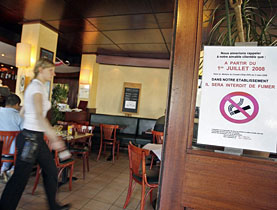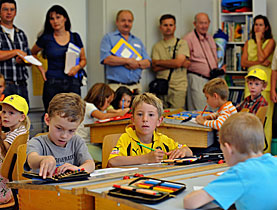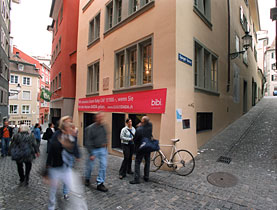Trend to ban smoking in public continues

Voters in and around Zurich have voted against allowing people to smoke in cafés and restaurants, supporting an initiative to protect passive smokers.
Smoking in the country’s most populated canton will be allowed in separate rooms that are well ventilated but where guests will not be served. Canton Basel City voted the same way.
In the central canton of Nidwalden, the electorate decided it would be up to the restaurateurs themselves to decide if they wanted to designate their establishments for smokers or not, so long as they made it clear at the entrance.
In Zurich, there were 168,780 votes for the move, with 129,534 “no” votes. With almost one in two voters turning out in canton Basel City, the vote was 27,427 against 24,533.
The votes follow a trend in Switzerland, with a continuing number of regions now banning smoking in public places.
Organisations against smoking welcomed Sunday’s votes, arguing they were a clear signal to parliament to pass laws on passive smoking that took them into account.
However, Gastrosuisse – the Swiss Hotel and Restaurant Association – argued the results in Zurich and Basel were close. It has been campaigning for liberal legislation on smoking in restaurants at the national level.
School system harmony
In other voting at the weekend, Lucerne in central Switzerland rejected a compulsory school system known as HarmoS that aims at harmonisation of education among the cantons.
Under the planned move, approved unanimously by the body representing the cantonal directors of education, the starting age for school would be reduced from six to four. There are a host of other measures aimed at simplifying the present structures.
The Lucerne referendum, launched by the rightwing Swiss People’s Party, resulted in 65,882 voting against HarmoS, with 41,399 supporting it. The voter participation was 44 per cent.
The result is considered an indicator because voters in five other cantons will shortly have their say on the issue, which opponents argue will entail higher costs.
In a reaction to the vote, the Conference of Cantonal Education Directors said it regretted the decision.
HarmoS can come into force if ten cantons approve it, while it will be compulsory for all if a two-thirds majority support it.
Support for culture
On a cultural note, voters in Zurich decided to continue to support the controversial Dada art movement’s birthplace with a subsidy of about SFr1 million ($917,011) over the next three years.
They voted by a margin of almost two to one to approve the payment to Cabaret Voltaire, which was opened in 2004.
A condition for the finance is that Cabaret Voltaire itself comes up with SFr400,000 annually in sponsorship money.
The rightwing Swiss People’s Party launched an initiative to pull the funding plug after a series of provocative events in the building, otherwise known as the Dada House.
The anti-establishment Dada movement was founded in Zurich in 1916 as an artistic expression of protest against the carnage of the First World War.
swissinfo with agencies
About 29 per cent of the Swiss population smokes, according to 2007 figures.
An estimated 8,300 people die from tobacco consumption in Switzerland annually.
There are around 16,000 cases of disability attributable to smoking.
In the six cantonal votes on smoking bans that took place before September 29, support for some form of ban has been very strong, up to 79 per cent in Geneva.
Accepted unanimously by the organisation representing the cantonal directors of education, the new harmonisation agreement, known as HarmoS, replaces the one in force since 1970.
The goal of HarmoS is to harmonise the parameters for compulsory schooling in Switzerland.
The starting age for compulsory schooling will be reduced from six to four.
Every school will be obliged to offer extra care options to families outside the traditional school day, such as school meals or supervised homework.
School lessons will be organised according to timetables, at least in the morning.
The teaching of foreign languages will be harmonised and it will not be obligatory to begin with one of the other national languages.
The Swiss People’s Party has initiated public votes on the acceptance of HarmoS in several cantons.

In compliance with the JTI standards
More: SWI swissinfo.ch certified by the Journalism Trust Initiative










You can find an overview of ongoing debates with our journalists here . Please join us!
If you want to start a conversation about a topic raised in this article or want to report factual errors, email us at english@swissinfo.ch.